|
|
|
Sort Order |
|
|
|
Items / Page
|
|
|
|
|
|
|
| Srl | Item |
| 1 |
ID:
180095
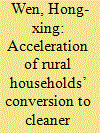

|
|
|
|
|
| Summary/Abstract |
This study investigated the existence of peer effects in the diffusion of clean cooking fuels among rural households in China and identified the mechanisms by which these peer effects were enacted from the perspective of social networks. We observed greater adoption of clean cooking fuels in areas in which adoption was already relatively high, however, this peer spill-over decreased over time and was regulated by the accessibility and strength of social networks. Specifically, if a household's social circle was more extensive or its communication with neighbours, relatives, and friends was closer, its choice of a clean cooking fuel was more likely to be affected by its peer groups. To stimulate stronger peer spill-over, we suggest that interventions such as strengthening social interactions across rural households should be included in the government's strategy to help more households convert to cleaner cooking fuels.
|
|
|
|
|
|
|
|
|
|
|
|
|
|
|
|
| 2 |
ID:
133716
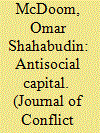

|
|
|
|
|
| Publication |
2014.
|
| Summary/Abstract |
Although popularly perceived as a positive force important for objectives such as economic development and democracy, social capital may also be linked to less desirable outcomes. This article highlights a dark side to social capital by pointing to its role in a particularly pernicious phenomenon: genocidal violence. Drawing on a survey of residents from one community that experienced violence during Rwanda's 1994 genocide, I show that individual participation in the violence was partly determined by the features of residents' social networks. Perpetrators possessed larger networks in general and more connections to other perpetrators in particular. The quality as well as quantity of connections also mattered. Strong ties generally, and kinship and neighborly ties specifically, were strong predictors of participation. In contrast, possession of countervailing ties to nonparticipants did not reduce a resident's likelihood of participation. Drawing on in-depth interviews to explore the possible mechanisms behind these findings, I suggest participants' networks fulfilled functions of information diffusion, social influence, and behavioral regulation. More broadly, the findings suggest the importance of social structure and social interaction for participation in collective violence. Relational data should complement individual attribute data in predicting participation. The findings also suggest, contrary to the neo-Malthusian interpretation, that the role played by Rwanda's extraordinarily high population density in the violence may have been more sociological than ecological in origin. The diffusion, influence, and regulatory effects of social connections are likely to be amplified in communities where individuals live in close spatial proximity to each other.
|
|
|
|
|
|
|
|
|
|
|
|
|
|
|
|
| 3 |
ID:
132143
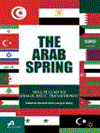

|
|
|
|
|
| Publication |
New York, Palgrave Macmillan, 2012.
|
| Description |
317p.Pbk
|
| Standard Number |
9781137344038
|
|
|
|
|
|
|
|
|
|
|
|
Copies: C:1/I:0,R:0,Q:0
Circulation
| Accession# | Call# | Current Location | Status | Policy | Location |
| 057828 | 320/HEN 057828 | Main | On Shelf | General | |
|
|
|
|
| 4 |
ID:
072629
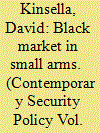

|
|
|
|
|
| Publication |
2006.
|
| Summary/Abstract |
In recent years, researchers have increasingly turned their attention to the proliferation of small arms, a transnational trade amounting to over $7 billion in value during 2002. Small arms are difficult to track and are not the stuff of military parades, but they are immensely destructive. As much as $1 billion worth enters the black market annually. I argue that the illicit trade in small arms should be understood not as a market but as a network, one that shares some important properties with networked forms of organization studied by sociologists. I then employ quantitative methods developed for the study of social networks in an effort to show the basic structure of illegal small arms transfers to Africa. The analysis draws from my Illicit Arms Transfers dataset still in development, so the results make use of the most rudimentary information being collected. They are suggestive, however, and the analytical approach promises to shed considerable light on a corner of the global arms trade that is of great interest to the research and activist communities, and of great consequence to those in war-torn regions of the world.
|
|
|
|
|
|
|
|
|
|
|
|
|
|
|
|
| 5 |
ID:
156756
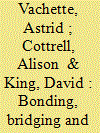

|
|
|
|
|
| Summary/Abstract |
Cyclone Pam (March 2015) was an unprecedented event in Vanuatu forcing the simultaneous involvement of national and long-term international actors, well integrated into the national disaster governance system, as well as numerous short-term international actors, unfamiliar with the geopolitical and cultural disaster context of the country. Cooperation between these three groups of actors evolved through the three scales of bonding, bridging and linking social networking. This paper questions the different drivers and challenges within and across these scales of social networks affecting cooperation among the three different groups of actors during an emergency. Using a mixed methodology based on social network analysis, this paper utilises the case study of Cyclone Pam in Vanuatu to study the strengths and weaknesses of the disaster governance system in place based on bonding and bridging social capital to conduct disaster risk management and to prepare the integration of linking social capital when external support is needed. This paper contributes to the identification of key considerations in the development of resilience-building strategies: the interactions of diverse actors to address disaster management needs and the reciprocal impacts of these interactions within and across the three different scales of social networks.
|
|
|
|
|
|
|
|
|
|
|
|
|
|
|
|
| 6 |
ID:
113276


|
|
|
|
|
| Publication |
2012.
|
| Summary/Abstract |
This paper examines the resilience of local Cambodian kinship and village communities in the aftermath of devastating violence. These communities are explored as cross-cutting sets of exchange relationships between local community residents, community members and their urban relatives, lay people and Buddhist monks, and the living and the dead - in the context of the annual phchum ben ceremony, or 'festival of the dead'. The phchum ben ceremony is an act of 'social resilience' in the spirit of this special issue; the ritual is an act of mourning, a demonstrative activity expressing grief, and a process to restore the disrupted social relations between the living and the deceased ancestors, especially those who died during war and the reign of the Khmer Rouge in the state known formally as Democratic Kampuchea (1975-79). The ritual focuses on community cohesion, as most rituals do, and social networks are enacted, recreated and displayed; by participating, people declare their membership of various social groups. The paper emphasizes that, in the contemporary economic and social context, the ritual is also about enacting and proclaiming social hierarchy, highlighting the gap between wealthy and powerful (now often urban) family members and their poor and dependent rural cousins.
|
|
|
|
|
|
|
|
|
|
|
|
|
|
|
|
| 7 |
ID:
112631
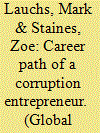

|
|
|
|
|
| Publication |
2012.
|
| Summary/Abstract |
The study of criminal career paths is necessary to understand the methods of success employed by high-performing criminals. The aim of this article is to focus on the career path of Jack Herbert who set up and maintained extensive corruption networks between organised crime groups and police in the Australian state of Queensland. This study builds on Morselli's work on the career paths of Sammy Gravano and Howard Marks that demonstrate how understanding social networks is an essential part of comprehending how organised criminals succeed. The data for this study were taken from the transcripts of the Fitzgerald Commission of Inquiry, which uncovered the extensive and resilient corruption network operated by Herbert. Herbert's relationships have been plotted to establish the nature of his operations. The findings indicate that communication of trust both allows for success and sets the boundaries of a network. Most importantly, this case study identifies Herbert's reliance on holding a monopoly as the cornerstone of his network power and position. This article adds to the literature on criminal career paths by moving away from a classic organised criminal grouping into the area of police corruption and uncovers the distinctive opportunities that this position offers the career criminal.
|
|
|
|
|
|
|
|
|
|
|
|
|
|
|
|
| 8 |
ID:
180704
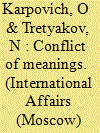

|
|
|
|
|
| Summary/Abstract |
THE RESULTS of the 2020 U.S. presidential elections represent the exact opposite of the outcome hoped for both in the United States and beyond. Rather than shed light on the future of America, its people and its policies, the elections of November 3 effectively plunged the "land of the free" into a chaos of existential uncertainty, deprived Americans of confidence in the future and inflamed the hostility of opposing political forces to the limit.
|
|
|
|
|
|
|
|
|
|
|
|
|
|
|
|
| 9 |
ID:
120877
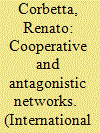

|
|
|
|
|
| Publication |
2013.
|
| Summary/Abstract |
In recent years (social) network approaches have been gaining ground in the field of international relations. Networks between states effectively explain patterns of international conflict and cooperation. One issue where conflict and cooperation converge-and where network analysis finds fruitful application-is the issue of third-party states' intervention in conflicts. This study investigates whether, and how, conflict expands in the international social space through the cooperative and antagonistic networks generated by states' supportive and oppositional interventions in international disputes. The study adopts a sociological theory of social units' interaction in the social space as a function of their multidimensional affinity to investigate further how such networks form. The hypotheses derived from this theoretical framework are tested using data on third-party non-neutral intervention in post-World War II militarized interstate disputes from Corbetta and Dixon (2005). Proximity in the international social space effectively predicts the creation of cooperative ties (supportive interventions) between states, while social distance predicts antagonistic ties (oppositional interventions).
|
|
|
|
|
|
|
|
|
|
|
|
|
|
|
|
| 10 |
ID:
179280
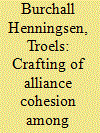

|
|
|
|
|
| Summary/Abstract |
In spite of several international interventions to contain and degrade militant groups in the Sahel region, al-Qaeda affiliated groups have managed to retain their alliance and even spread and intensify their use of violence. This article explains the cohesion of the insurgency alliance as the outcome of a number of sound strategic decisions. By applying a framework of irregular strategy, the article examines the processes of early adaption to pre-existing social networks and the subsequent shaping through political, violent, and communicative lines of effort. Although the primary purpose of the strategy was not alliance cohesion, the result is that al-Qaeda related networks cooperate across ethnic and social cleavages, despite the many setbacks and dilemmas that local politics generate. The article adds an agency-oriented perspective to the growing literature on insurgency fragmentation and cohesion, which are major factors in the outcome of civil wars.
|
|
|
|
|
|
|
|
|
|
|
|
|
|
|
|
| 11 |
ID:
151192


|
|
|
|
|
| Summary/Abstract |
Possibilities for crowdsourced surveillance have expanded in recent years as data uploaded to social networks can be mined, distributed, assembled, mapped, and analyzed by anyone with an uncensored internet connection. These data points are necessarily fragmented and partial, open to interpretation, and rely on algorithms for retrieval and sorting. Yet despite these limitations, they have been used to produce complex representations of space, subjects, and power relations as internet users attempt to reconstruct and investigate events while they are developing. In this article, I consider one case of crowdsourced surveillance that emerged following the detonation of two bombs at the 2013 Boston Marathon. I focus on the actions of a particular forum on reddit.com, which would exert a significant influence on the events as they unfolded. The study describes how algorithmic affordances, internet cultures, surveillance imaginaries, and visual epistemologies contributed to the structuring of thought, action, and subjectivity in the moment of the event. I use this case study as a way to examine moments of entangled political complicity and resistance, highlighting the ways in which particular surveillance practices are deployed and feed back into the event amid its unfolding.
|
|
|
|
|
|
|
|
|
|
|
|
|
|
|
|
| 12 |
ID:
142604
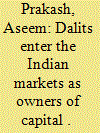

|
|
|
|
|
| Summary/Abstract |
Dalits find themselves included in India’s markets at adverse terms, due to the lack of social networks based on caste locations. This paper argues for considering caste as a specific Indian form of civil society—as a site of accumulation.
|
|
|
|
|
|
|
|
|
|
|
|
|
|
|
|
| 13 |
ID:
185043
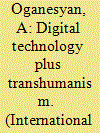

|
|
|
| 14 |
ID:
072715
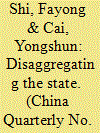

|
|
|
|
|
| Publication |
2006.
|
| Summary/Abstract |
Collective action directed at the government is not rare in China, but why some actions endure and succeed whereas many others fail remains inadequately addressed. Based on a case of home owners' sustained collective resistance in Shanghai, this study finds that state power is fragmented at the local level. While the disparate priorities among different levels of state authorities provide opportunities for resistance, social networks between participants of collective action and officials or media workers may significantly help the former to achieve success.
|
|
|
|
|
|
|
|
|
|
|
|
|
|
|
|
| 15 |
ID:
166630


|
|
|
|
|
| Summary/Abstract |
Each ethnic enclave has its own idiosyncrasies, leading to disagreements as to the functions they serve for the migrants inhabiting them. However, three main functions may be identified across scholarly literature: shielding, economic and cultural. This article explores to what extent the spatial organization of the ethnic enclave is necessary for fulfilling these functions by taking the case of the Chinese international students in a Norwegian town. These students comprise a relatively cohesive group, and their conational social networks serve most of the same purposes of ethnic enclaves without the need for a separate neighbourhood. While most of their material needs are met, the students still express a lack of belonging, a need for a place that is ‘for us’, and they present an example of how an ethnic space is constructed without the need for a traditional ‘Chinatown’.
|
|
|
|
|
|
|
|
|
|
|
|
|
|
|
|
| 16 |
ID:
100349
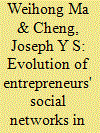

|
|
|
|
|
| Publication |
2010.
|
| Summary/Abstract |
The issue of social networks is central to scholars' examinations of China's economic reform and its transitional society. This article presents an effort to examine the impact of the property rights reform on the evolution of entrepreneurs' social networks in the context of rural China. This study proposes three different patterns of social networks: in-group networks, official-centered networks, and market-oriented networks; and examines how the significance of different network patterns has evolved under the context of institutional change. By using data collected in Wuxi city, Jiangsu province, China, this article attempts to explore four significant questions. Do social networks still matter? How is the significance of different patterns of social networks changing? Why could this happen? In which fields do social networks still matter?
|
|
|
|
|
|
|
|
|
|
|
|
|
|
|
|
| 17 |
ID:
149195
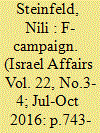

|
|
|
|
|
| Summary/Abstract |
In the 2015 Israeli national elections, social media and especially Facebook were used as primary campaign platforms, where politicians of all parties and orientations expressed their agendas, made policy statements and communicated with potential voters. The present article employs a new methodology, discourse network analysis, to explore the relationships between party leaders and discourse themes, based on leaders’ pre-election statements on Facebook. The findings highlight prominent themes and the relationships formed between leaders and themes, and between leaders and each other. The network formed by party leaders’ shared agendas and themes resembles the parties’ positioning in the parliament after the election, strengthening the assumption that Facebook has been used strategically as a campaign tool by the leaders of parties running for parliament.
|
|
|
|
|
|
|
|
|
|
|
|
|
|
|
|
| 18 |
ID:
101325
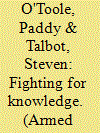

|
|
|
|
|
| Publication |
2011.
|
| Summary/Abstract |
Organizational Learning
Learning Systems
Learning Organization
Social Networks
Australia
Army
|
|
|
|
|
|
|
|
|
|
|
|
|
|
|
|
| 19 |
ID:
185931
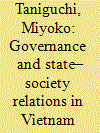

|
|
|
|
|
| Summary/Abstract |
The coronavirus disease (COVID-19) has given rise to dichotomous debates in international politics on whether authoritarian or democratic governance is more effective in responding to the pandemic. This study argues that the Vietnamese government, which is categorized as authoritarian, effectively managed the COVID-19 pandemic, at least until 2021, by utilizing vertical and horizontal political systems, networks, and social media platforms; increasing accountability and transparency through risk communication and providing scientifically credible information; and mobilizing organizations affiliated with the Communist Party of Vietnam (CPV) and its diverse stakeholders. In the process, these social attempts have provided more room for citizens to participate in combating this pandemic that has resulted in a change in state–society relations. However, this change might not continue in reforming daily life.
|
|
|
|
|
|
|
|
|
|
|
|
|
|
|
|
| 20 |
ID:
126566
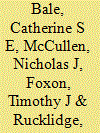

|
|
|
|
|
| Publication |
2013.
|
| Summary/Abstract |
This paper presents results from modelling work investigating the effects of social networks on the adoption of energy technologies in the domestic sector. This work concerns ideas on social network interventions which have been successfully applied in other domains but which have seldom been applied to energy policy questions. We employ a dynamical multi-parameter network model where households are represented as nodes on a network for which the uptake of technologies is influenced by both personal benefit and social influences. This is applied to demonstrate the usefulness of this type of model in assessing the likely success of different roll-out strategies that a local authority could pursue in promoting the uptake of domestic energy technologies. Local authorities can play a key role in the retrofit of energy-efficiency and low-carbon energy-generation technologies in order to realise carbon reductions and alleviate fuel poverty. Scenarios are modelled for different local authority interventions that target network interactions and uptake threshold effects, and the results provide insights for policy. The potential for the use of this type of modelling in understanding the adoption of energy innovations in the domestic sector and designing local-level interventions is demonstrated.
|
|
|
|
|
|
|
|
|
|
|
|
|
|
|
|
|
|
|
|
|